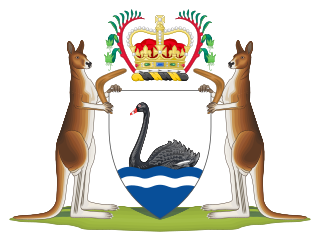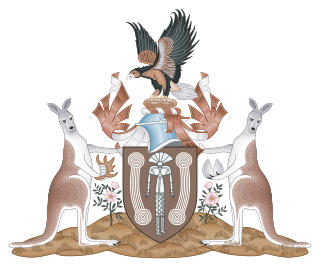Related Research Articles

A justice of the peace (JP) is a judicial officer of a lower court, elected or appointed by means of a commission to keep the peace. In past centuries the term commissioner of the peace was often used with the same meaning. Depending on the jurisdiction, such justices dispense summary justice or merely deal with local administrative applications in common law jurisdictions. Justices of the peace are appointed or elected from the citizens of the jurisdiction in which they serve, and are usually not required to have any formal legal education in order to qualify for the office. Some jurisdictions have varying forms of training for JPs.

The Supreme Court of Western Australia is the highest state court in the Australian State of Western Australia. It has unlimited jurisdiction within the state in civil matters, and hears the most serious criminal matters.
David Harold Eastman is a former public servant from Canberra, Australia. In 1995, he was wrongfully convicted of the murder of Australian Federal Police Assistant Commissioner Colin Winchester and was sentenced to life imprisonment without parole. A 2014 judicial inquiry recommended the sentence be quashed and he should be pardoned. On 22 August of the same year, the Supreme Court of the Australian Capital Territory quashed the conviction, released Eastman from prison, and ordered a retrial.

Linda Jean Burney is an Australian politician, a member of the Australian Labor Party (ALP) and the member of Parliament (MP) for the division of Barton since 2016. She was the minister for Indigenous Australians from 2022 to July 2024. She was formerly a member of the New South Wales Legislative Assembly (MLA) for the district of Canterbury from 2003 to 2016 and previously a teacher. Burney is the first known woman to identify as Aboriginal to be elected to the Australian House of Representatives.

The Magistrates Court of South Australia is the lowest level court in the state of South Australia. The Magistrates Court, then known as the Court of Petty Sessions, was established in 1837, by the Court of Sessions Act 1837. It has both original and appellate jurisdiction and hears matters specified in the Magistrates Court Act 1991 (SA).

The Local Court of the Northern Territory is one of two levels of court in the Northern Territory of Australia. It has jurisdiction in civil disputes up to A$250,000, and in criminal cases in the trial of summary offences, and also deals with preliminary matters for indictable offences which are then heard by the Supreme Court of the Northern Territory. There are local courts held in Darwin, Alice Springs, Katherine, Tennant Creek, and some "bush courts" in remote locations.
Sue Gordon is an Aboriginal retired magistrate from Western Australia who has been locally and nationally honoured for her work with Aboriginal people and in community affairs. She is known for being chair of the Gordon Inquiry in 2002.

Susan Mary Kiefel is an Australian lawyer and barrister who was the 13th Chief Justice of Australia from 2017 to 2023. She concurrently served on the High Court of Australia from 2007 to 2023, previously being a judge of both the Supreme Court of Queensland and the Federal Court of Australia. Kiefel is the first woman to serve in the position of Chief Justice.
Jeffrey Allan Miles was an Australian author and jurist. He was a Chief Justice of the Australian Capital Territory. He also held judicial appointments in New South Wales and Papua New Guinea. In 2005 he conducted a judicial review into the fitness to be tried of David Eastman who had been convicted of murdering Australian policeman Colin Winchester. In 2008, he was elected President of the Australian Capital Territory Branch of the International Commission of Jurists.

Sir Richard Arthur Blackburn was an Australian judge, prominent legal academic and military officer. He became a judge of three courts in Australia, and eventually became chief justice of the Australian Capital Territory. In the 1970s he decided one of Australia's earliest Aboriginal Land rights cases. The annual Sir Richard Blackburn Memorial lectures in Canberra commemorate his service to the Australian legal community.
The Judiciary of Sri Lanka are the civil and criminal courts responsible for the administration of justice in Sri Lanka. The Constitution of Sri Lanka defines courts as independent institutions within the traditional framework of checks and balances. They apply Sri Lankan Law which is an amalgam of English common law, Roman-Dutch civil law and Customary Law; and are established under the Judicature Act No 02 of 1978 of the Parliament of Sri Lanka.

The judiciary of New Zealand is responsible for the system of courts that interprets and applies the laws of New Zealand. It has four primary functions: to provide a mechanism for dispute resolution; to deliver authoritative rulings on the meaning and application of legislation; to develop case law; and to uphold the rule of law, personal liberty and human rights. The judiciary is supported in its work by an executive department, the Ministry of Justice.
Timothy Francis Carmody is an Australian judge who was the Chief Justice of Queensland between 8 July 2014 and 1 July 2015. His previous roles include work as a police officer, barrister, Queensland Crime Commissioner, Family Court of Australia judge, and Chief Magistrate of the Magistrates Court of Queensland. He also presided over the 2013 Child Protection Commission of Inquiry.
Jane Hamilton Mathews was a judge of the Supreme Court of New South Wales, a judge of the Federal Court of Australia and President of the Administrative Appeals Tribunal.
Judicial independence is regarded as one of the foundation values of the Australian legal system, such that the High Court held in 2004 that a court capable of exercising federal judicial power must be, and must appear to be, an independent and impartial tribunal. Former Chief Justice Gerard Brennan described judicial independence as existing "to serve and protect not the governors but the governed", albeit one that "rests on the calibre and the character of the judges themselves". Despite general agreement as to its importance and common acceptance of some elements, there is no agreement as to each of the elements of judicial independence.
ʻElisapeti Lavakeiʻaho Makoni Langi is a Tongan lawyer and judge. She was the first woman appointed as a magistrate in Tonga, and also the first to serve on the Supreme Court of Tonga.
References
- 1 2 3 4 Moran, Alexis (26 July 2023). "Kamilaroi woman Louise Taylor will become the first Indigenous female Supreme Court judge". NITV . Retrieved 26 July 2023.
- 1 2 3 4 5 6 "Louise Taylor". Indigenous Law Centre: UNSW Law. Retrieved 10 March 2019.
- 1 2 "Louise Taylor LLB '01, BA '01". ANU . 17 September 2018. Retrieved 10 March 2019.
- 1 2 3 4 Foden, Blake (17 September 2018). "'You can't be what you can't see': ACT's first Aboriginal magistrate". The Canberra Times . Retrieved 10 March 2019.
- 1 2 Inman, Michael (10 August 2018). "ACT appoints its first Aboriginal judicial officer". The Canberra Times . Retrieved 10 March 2019.
- ↑ "Inquiry into the Conviction of David Harold Eastman for the Murder of Colin Stanley Winchester: Report of the Board of Inquiry" (PDF). 2014.
- ↑ "Eastman inquiry recommends David Eastman's conviction be quashed, finds miscarriage of justice". ABC News (Australia) . 30 May 2014. Retrieved 26 July 2023.
- 1 2 3 4 Byrne, Elizabeth (26 July 2023). "Louise Taylor becomes Australia's first female Indigenous Supreme Court judge". ABC News (Australia) . Retrieved 26 July 2023.
- 1 2 3 Bushnell, Ian. "Louise Taylor becomes ACT's newest magistrate and first Aboriginal judicial officer". The RiotACT. Retrieved 10 March 2019.
- ↑ "Historic day as Louise Taylor appointed ACT's first Aboriginal magistrate". Women's Agenda. 18 September 2018. Retrieved 10 March 2019.
- ↑ Ramsay, Gordon (8 October 2018). "Eighth Magistrate appointed". Chief Minister, Treasury and Economic Development Directorate. Retrieved 10 March 2019.
- ↑ "Historic Judicial Appointment". ABC Radio. 3 September 2018. Retrieved 10 March 2019.
- ↑ Hislop, Madeline (26 July 2023). "Louise Taylor becomes first Aboriginal woman appointed to Supreme Court". Women's Agenda. Retrieved 26 July 2023.
- 1 2 "Louise Taylor". The Guardian . Retrieved 10 March 2019.